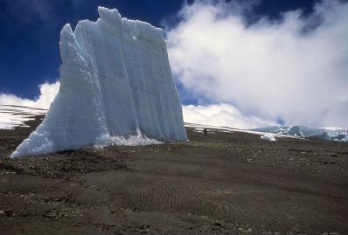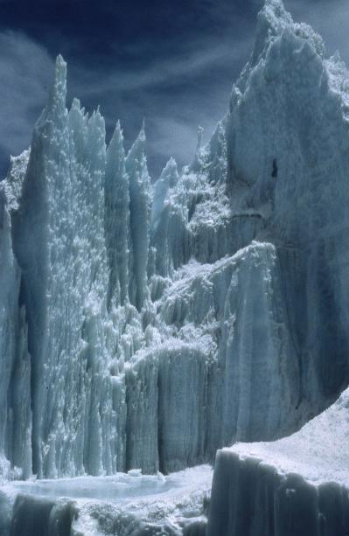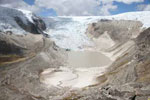タンザニアにあるアフリカ最高峰キリマンジャロ。頂上氷原にて行われた最近の調査で、その氷原が20年以内にすべて消え去ってしまう可能性が高いことがわかった。

キリマンジャロ:溶解が進み、孤立した氷塊 |
ジャーナル誌「the Proceedings of the National Academy of Science(PNAS)」に掲載されたその研究でわかったことは、1912年から2007年までにキリマンジャロを覆う氷原のうち85%が消え去ったこと。そして、そのうちの26%が2000年から溶解したということだ。
その氷床コアの調査では、11,700年前のものと思われる表層までさかのぼって行われた。キリマンジャロの氷原は現代まで溶解した形跡がなく、4,200年前に300年間続いたとされる干ばつにも耐えていた模様だ。

気温上昇による侵食が進んだ氷原 |
その氷床コアの調査では、11,700年前のものと思われる表層までさかのぼって行われた。キリマンジャロの氷原は現代まで溶解した形跡がなく、4,200年前に300年間続いたとされる干ばつにも耐えていた模様だ。
雲の減少による氷原表層面の気温上昇、降水量の変化がこの溶解をもたらした要因と考えられる。
この研究結果は劇的な気候変動を示す証拠となるだろう。
Related articles
Glaciers decline in ice mass for 18th straight year
(01/30/2009) Glaciers worldwide lost ice mass for the 18th consecutive year due to warming temperatures and reduce snowfall, reports the University of Zurich’s World Glacier Monitoring Service. Alpine glaciers lost on average 1.3 meters of thickness in 2006 and 0.7 meters in 2007, extending an 11.3-meter (36-foot) retreat since 1980.
99% of Alaska’s large glaciers are retreating
(10/07/2008) The bulk of glaciers in every mountain range and island group in Alaska are retreating, thinning, or stagnating, according to a new book by the U.S. Geological Survey (USGS).
NASA images reveal two massive glaciers breaking apart in Greenland
(08/22/2008) Two of Greenland’s largest glaciers are breaking up report researchers monitoring NASA satellite images.
Lack of A-bomb signatures suggest 50 years of shrinking Tibetan glaciers
(12/30/2007) Ice cores drilled last year from the summit of a Himalayan ice field lack the distinctive radioactive signals that mark virtually every other ice core retrieved worldwide. That missing radioactivity, originating as fallout from atmospheric nuclear tests during the 1950s and 1960s, routinely provides researchers with a benchmark against which they can gauge how much new ice has accumulated on a glacier or ice field.
Glaciers in western China shrank 20% in 40 years
(07/13/2007) Glaciers in Western China have melted at “alarming” rates over the past 40 years, according to Chinese state media.
Glaciers speed up due to global warming
(06/05/2007) Antarctic glaciers are moving faster due to global warming, reports the British Antarctic Survey.
Largest tropical glacier retreating at 200 feet per year in Peru

(02/18/2007) Peru’s largest glacier is melting rapidly and could complete disappear by 2012 says a glaciologist from Ohio State University. Speaking at the annual meeting of the American Association for the Advancement of Science in San Francisco last week, Dr. Lonnie Thompson said that Peru’s Qori Kalis glacier is melting at a rate of some 60 meters (200 feet) per year. Qori Kalis glacier is part of the Quelccaya Ice Cap, the largest body of ice in the tropics.
Why some Himalayan glacies aren’t melting due to climate change
(08/25/2006) New research into climate change in the Western Himalaya and the surrounding Karakoram and Hindu Kush mountains could explain why many glaciers there are growing and not melting. The findings suggest this area, known as the Upper Indus Basin, could be reacting differently to global warming, the phenomenon blamed for causing glaciers in the Eastern Himalaya, Nepal and India, to melt and shrink.
Alps could lose 80% of glacier cover by 2100
(07/10/2006) The European Alps could lose 80 percent of their glacier cover by the year 2100, if summer air temperatures increase by three degrees Celsius according to a study published in Geophysical Research Letters, a journal of the American Geophysical Union. The research, based on modeling experiments by Swiss scientists, found that should in summer temperature rise more than three degree Celsius, only the largest glaciers and those on the highest mountain peaks could survive into next century.
Last 50 years ‘unusually warm’, tropical glaciers melting rapidly finds research
(06/27/2006) Researchers studying ancient tropical ice cores have found evidence of two abrupt climate shifts — one 5000 years ago and one currently underway. The findings, published in the current issue of the journal Proceedings of the National Academy of Science, may have important implications for immediate future since more than two-thirds of the world’s population resides in the tropics.
Africa’s glaciers gone by 2025
(05/15/2006) Fabled equatorial icecaps will disappear within two decades, because of global warming, a study British and Ugandan scientists has found. In a paper to be published 17 May in Geophysical Research Letters, they report results from the first survey in a decade of glaciers in the Rwenzori Mountains of East Africa. An increase in air temperature over the last four decades has contributed to a substantial reduction in glacial cover, they say.